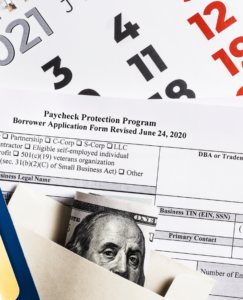The Biden administration has announced a set of reforms to the Paycheck Protection Program. These changes are intended to expand access to the program for the most disadvantaged business owners – many of whom are people of color in low-to-moderate income communities – and to remove structural inequities that were established in previous iterations of the program.
According to the new rules, the Paycheck Protection Program will:
- Offer a 14-day period, starting Wednesday, February 24, during which only small businesses with fewer than 20 employees will be able to apply for a PPP loan. Micro businesses such as these struggle when completing loan applications more often than their larger counterparts. This period will allow lenders to focus on helping the smallest businesses with their applications.
- Revise and amend the PPP loan calculation formula for sole-proprietors, independent contractors and self-employed applicants, to be based on gross income. The original provision calculated the loan amount based on a business’ net profit, which resulted in many micro enterprises being effectively excluded from the program or receiving loans under $100. CAMEO and many other organizations had previously called for a change to this rule to accurately reflect the funding needs of these small businesses.
- Set aside $1 billion for businesses in the sole-proprietorship, independent contractor, and self-employed category that have no employees and are located in low-to-moderate income areas.
- Expand PPP eligibility to small business owners who have non-fraud felony convictions, unless the owner is incarcerated at the time of the application.
- Allow business owners with federal student loan delinquencies to apply for a PPP loan.
- Ensure access for non-citizen small business owners who are lawful U.S. residents by clarifying that they may use Individual Taxpayer Identification Numbers (ITINs) to apply for a PPP loan.
In addition to these specific changes to the rules of the Paycheck Protection Program, the Biden administration has also committed to ensure equitable distribution of relief dollars through the following actions:
- Increasing oversight to address waste, fraud, and abuse across all federal programs. For example, the SBA now conducts manual loan reviews for the largest loans in the PPP portfolio and a random sampling of other loans.
- Revamping the PPP application to increase transparency and accountability.
- Updating key areas of SBA websites to make resources easier to find for applicants.
- Conducting extensive stakeholder outreach to discuss the challenges facing small businesses face and how to provide that critical relief.
- Improving relationships with lenders through a new SBA initiative.
From its inception, the Paycheck Protection Program was compromised by structural flaws that strongly disadvantaged the most underserved businesses, especially those owned by people of color. These recent changes announced by the Biden administration are a step in the right direction to remove these barriers to relief for those who need it most. But there is still a lot of work to be done in this regard. For instance, the new PPP rules will only apply prospectively. We will continue to advocate so that Congress approves a retroactive fix to help the businesses that have fallen through the cracks in the past year.
Learn more about PPP
Citibank is hosting a series of free webinars about the Paycheck Protection Program. These educational webinars will provide an introduction to PPP and will focus on how to apply for a First Draw PPP Loan and loan forgiveness.
First Draw PPP Loans Webinars
- February 25, 2021 at 12:00pm PST
- March 4, 2021 at 12:00pm PST
- March 9, 2021 at 12:00pm PST
Loan Forgiveness Webinars
- March 18, 2021 at 12:00pm PST
- April 1, 2021 at 12:00pm PST
- April 15, 2021 at 12:00pm PST
- April 29, 2021 at 12:00pm PST

